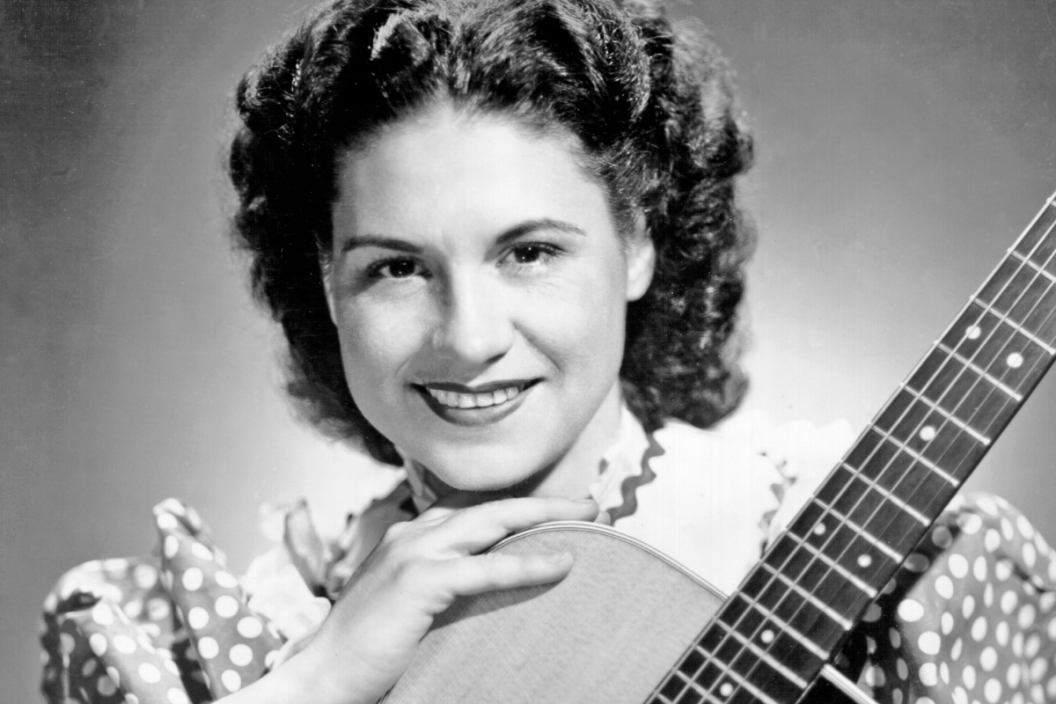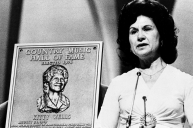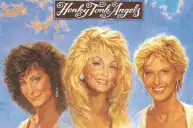Kitty Wells was a badass. And though many people know her country music contemporaries better — Patsy Cline, Dolly Parton, Loretta Lynn, Tammy Wynette and the like — there wouldn't be any of them if not for Wells setting the precedent that women were capable of topping the country charts.
She was, by most accounts, the first real female country star. In a genre dominated by men on all fronts, Wells emerged as a singular female voice to destroy stereotypes of the time.
Classic country songs were written by men, performed by men, and sang by men who were managed, recorded, produced and promoted by men. But when Kitty Wells released "It Wasn't God Who Made Honky Tonk Angels," she set in motion the single domino that would change all of that. And it all started with another song.
Hank Thompson's Hit Inspires A Movement
In 1952, Hank Thompson was a fledgling country singer looking for the spotlight. Several years out of the Navy, the Waco native punched his ticket with a song called "The Wild Side Of Life."
Thompson had been recording with Capitol Records since 1947, and he found limited success in 1949. But 70 years ago, three years was an eternity to go without a hit in the music business. Thompson needed a big song in a big way.
Jimmy Heap and His Melody Masters recorded "The Wild Side Of Life" a year before Thompson. One of those "melody masters," Arlie Carter, wrote the tune along with William Warren. For whatever reason, that version just never took off.
But one year later, Hank Thompson's version sure did. It ultimately became the song of 1952, spending 15 weeks at No. 1 and 19 weeks in the Top 10 altogether.
The song came about as a sort of lament. Carter and Warren wrote a heartbroken character who blames love lost on the wayward desires of a woman to go out at night. It echoed a decaying sentiment that good girls don't go out at night and party.
The song included the infamous line, "I didn't know God made honky-tonk angels," a cynical and sarcastic term applied to women who go out at night.
The song found an audience. Probably in heartbroken men who could share in the main character's sorrow.
Yet, even in 1952, an influential collective of artists and writers were bubbling under, just waiting for the right moment to rebel against restrictive societal expectations. The success of "The Wild Side Of Life" was the perfect chance.
Kitty Wells Steps In
Similar to Thompson, Kitty Wells had limited success beginning in 1947. She recorded under RCA Victor and toured in various facets with her husband, Johnny Wright. Wright was a massive champion of her as a singer (he also suggested her stage name "Kitty Wells") and eventually convinced Decca Records to take on Wells as a country vocalist.
Wright did so even against Roy Acuff's assertion that women couldn't headline shows or sell country records. Spoiler alert: Roy Acuff was very, very wrong.
Wells' first-ever session with Decca ended up being "It Wasn't God Who Made Honky Tonk Angels." Already a mother of three, Wells wasn't even sure she'd pursue a solo career in music. But she agreed to step foot in the studio for the standard $125 session fee for performing.
Curiously enough, that song was also written by a man, Louisiana-born songwriter J.D. Miller. Miller lived the swamp pop, Cajun and zydeco worlds primarily. The idea of challenging a man's authority through song was much more severe in a conservative environment like country music.
Dueling Viewpoints
Thompson's song hit the airwaves in March 1952, J.D. Miller wrote his response shortly after and Kitty Wells was in the studio recording it by May. In June, just a few short weeks after the original, the answer song "It Wasn't God Who Made Honky Tonk Angels" shocked a lot of the male-dominated country world.
Who was this female singer accusing wayward men of creating wayward women? The notion that a relationship was only as strong as its least faithful member turned a lot of cheeks red around Nashville.
And imagine how short a period that was. You had a country hit go to No. 1 for 15 weeks while a song challenging the underlying message of that song climbed up at the same time. It was a very exciting (and for some, scandalous) time to be a country music fan.
Interestingly enough, both songs were set to a famous traditional melody from the 1920s. Roy Acuff also used that same melody to success in a 1936 rendition of "Great Speckled Bird." It's no small irony that Wells' massive sales success came using the same melody used by a man who said women couldn't sell records (her song sold more than his, too).
Massive Success And Controversy
"It Wasn't God Who Made Honky Tonk Angels" was banned by the NBC radio network for being suggestive. No doubt, that radio network was run by men who were embarrassed by the notion of a woman calling them on their crap.
Wells was also prohibited from playing it at the Grand Ole Opry (my, how times have changed). But none of that mattered because the song spoke to an audience eager challenge societal norms but afraid to be the first to do so. It went to No. 1 and stayed there for six weeks. That officially made Kitty Wells the first solo female act to top the Billboard country music charts. The song sold more than a million copies, an astounding feat not just for a female, but any artist.
Wells followed up her debut smash with another hit tune, "Release Me." She again tackled adultery, a taboo subject for women to breach. She would eventually go on to have 84 more singles, including 38 top 10 hits, in her decades-long career.
Inspiring A New Wave Of Badasses
More than anything, Wells showed the suits there is a physical, tangible desire to hear essential stories from a woman's point of view. Women's liberation and songs like Loretta Lynn's "The Pill" were still a decade away when Wells stepped out front.
Her success inspired the signings of several other now-legendary female artists, including Patsy Cline (a bona fide badass in her own right). Even today, artists like Lee Ann Womack and Kacey Musgraves carry some distinct traits brought forth by Kitty Wells.
Noted country music historian Robert K. Oermann told NPR, "Any Southern female country singer is going to be influenced — there's just no question about that." The undeniable influence Wells inspires even in today's music earned her the rightful title, "The Queen of Country Music." And it all started with one song.
Editor's Note: This post was originally published on September 21, 2016.
'It Wasn't God Who Made Honky Tonk Angels' Lyrics:
As I sit here tonight the jukebox playing
The tune about the wild side of life
As I listen to the words you are saying
It brings memories when I was a trusting wife.
It wasn't god who made honky tonk angels
As you wrote in the words of you're song
Too many times married men think they're still single
That has caused many of good girls to go wrong
It's a shame that all the blame is on us women
It's not true that only you men feel the same
From the start most every heart that's ever been broken
Was because there always was a man to blame
It wasn't god who made honky tonk angels
As you wrote in the words of your song
Too many times married men think they're still single
That had caused many of good girls too go wrong




